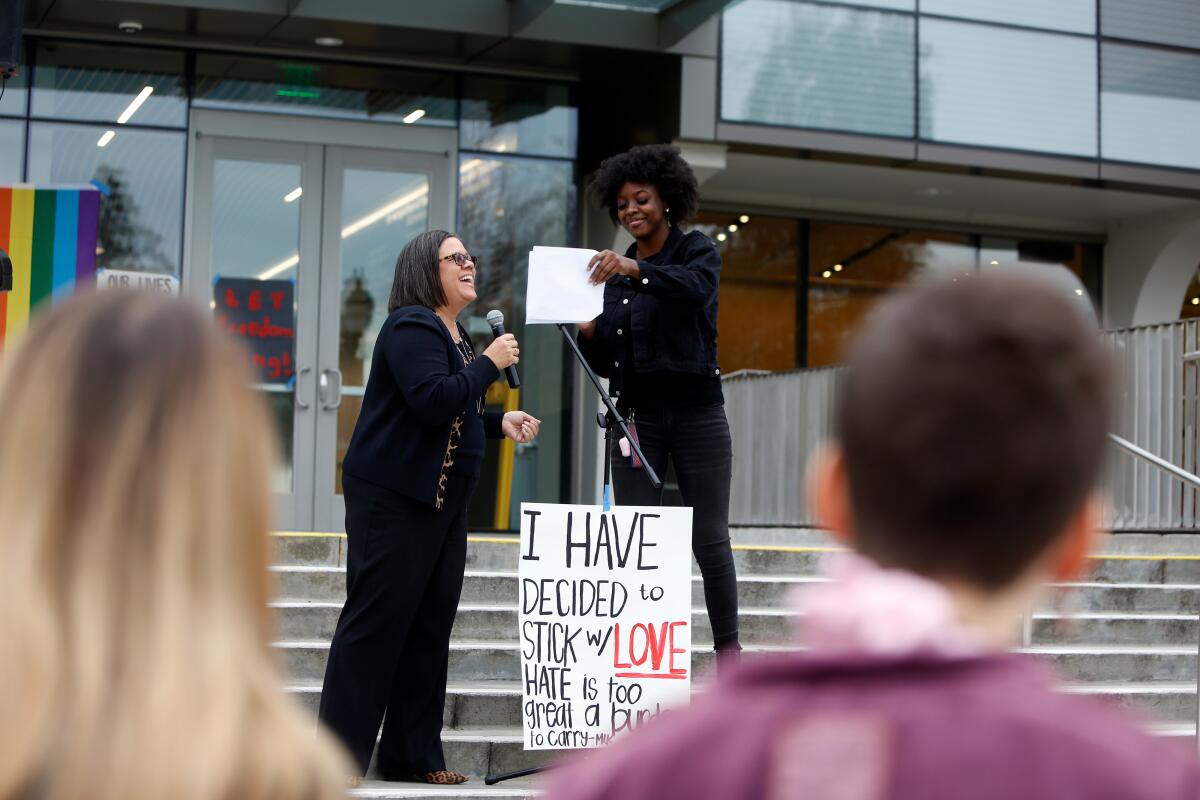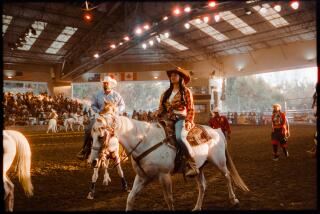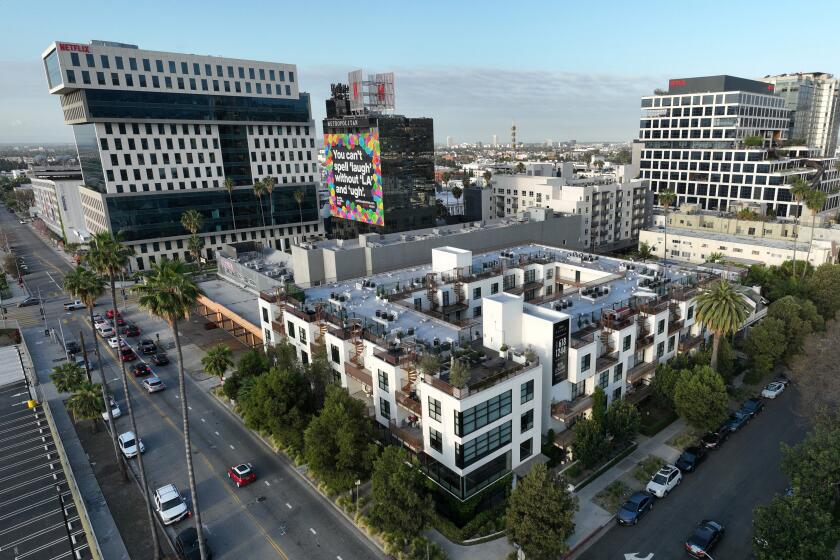One student’s fight for black inclusion at Whittier College — with the campus president’s help

- Share via
When Journee Bradford arrived at Whittier College as a freshman in the fall of 2017, she expected to encounter a place far more diverse than her hometown of Shreveport, La., where 95% of residents identified as black or white.
What Bradford found at the 133-year-old liberal arts college surprised and dismayed her. Although more than half of the 1,723 undergraduate students identified as Latino or Hispanic, less than 5% identified as African American or black. Black academics and administrators were rare, and the college didn’t officially observe Martin Luther King Jr.’s birthday.
“For the black students on campus, especially those not from the area, coming to Whittier has been an eye-opener,” said Bradford, 20, a business and entertainment management double-major who identifies as black. “It’s been a big adjustment for a lot us, especially when you don’t see black students or professors or administrators. You feel like you’re not welcome.”
Five months later, Los Angeles native Linda Oubré, who is part black and part Jewish, was named president of Whittier, the first non-white person to hold that post.
In the months that followed, the two women came to a common crossroad: reckoning with the touchy issue of race at a place where diversity and tolerance were prized, but being black sometimes meant feeling alone.
Separated by 40 years and differing cultural and regional upbringings, they would become the driving force and faces of change on campus. Their efforts would converge around the weighty symbolism of King’s birthday, which is recognized as a federal holiday on the third Monday in January.
Of 48 private universities and colleges located throughout Southern California — including liberal arts, religious, traditional, medical and specialty four-year schools — Whittier College is believed to be one of two that hold classes on MLK Day, along with the University of Redlands.
But while Redlands hosts a week’s worth of events leading up to MLK Day, Whittier College went years without holding any MLK Day celebrations. For many black students at Whittier, the short shrift given to King’s birthday symbolized a deeper problem. Even the college’s Black Student Union, an organization that assists and promotes African American students, was close to folding in the fall of 2018.
The sense of isolation felt by many black students ran counter to the school’s image of inclusivity, highlighted by the hiring of Oubré. Whittier’s persona has shifted in the decades since the school’s most famous alumnus, Richard M. Nixon, rode to victory in the 1968 presidential election, thanks in part to his employment of the divisive “Southern strategy,” using racially coded appeals to galvanize white voters.
“Sometimes I wonder what Richard Nixon would be thinking to have me running his alma mater,” Oubré said.
From a statistical standpoint, Whittier College is perhaps more diverse than Nixon could have imagined.
The university is a minority-majority campus with 50.9% of undergraduate students identifying as Hispanic or Latino, 6.8% Asian and 7.1% two or more races, based on 2018 statistics provided by Whittier College.

The school estimates that 70% of its associated students are minorities, up from 39.1% in 2003. In 2015, U.S. News & World Report ranked the university as the No. 10 most diverse national liberal arts college and No. 3 in California.
Yet, of Whittier College’s 1,723 undergraduate students, only 4.6%, or 79, identify as African American or black, which trails the 6.5% and 9% of black residents living in California and Los Angeles County, according to census data, respectively.
Sophomore Julie Ann Ayree, a Fremont, Calif., native and business major, said she’s only attended one class with a black professor. On an average day it’s quite possible for her to cross campus and not see another black student.
Another sophomore, Ethan Pewu, said that, other than running into his friend, fellow sophomore Myles Malone, he can go days without speaking to another black student.
“You come to Southern California thinking you’re going to be in this diverse place, and it is diverse to an extent, but it’s also lonely,” said Pewu, a Boston native. “So, you see students from all backgrounds, but you also don’t feel any support. You feel isolated, like an outsider.”
Before starting her junior year last fall, Bradford worked on unifying the black student community.
Her first move was to establish a new group, the school’s Black Student Assn., a club that would offer activities and opportunities for student bonding and the sharing of experiences.
“You really have to give credit to Journee because she’s worked to bring us together,” said Malone, treasurer of the Black Student Assn. “She saw a need and saw that we were separated.”
While the club participated in a backpack drive for needy area families and a silent auction, its most successful outing, in terms of attendance, took place last fall when Bradford invited students to play the popular “Black Card Revoked” trivia game, which tests players’ knowledge of African American history and popular culture.
“We had people on the dance team and in sports who were rushing from practice to get to the meeting so they could all play,” Bradford said. “It was amazing to see our community together, just playing and talking.”
In November, Bradford took the first steps toward challenging the school’s practice of not observing MLK Day, thanks in part to guidance from Oubré.
With assistance from the school’s office of equity and inclusion, where Bradford serves as a student leader, the junior created and circulated a Change.org petition. The open letter received more than 400 signatures from students, faculty, staff and community members.
Bradford was optimistic that her efforts would be backed by Oubré. The onetime dean of the business college at San Francisco State and a former Los Angeles Times general manager held her formal inauguration last year, on Feb. 23 during Black History Month.
I realized that just by walking into the room, I’m change.
— Whittier College President Linda Oubré
“I realized that just by walking into the room, I’m change,” said Oubré, the daughter of five-time Emmy-award winning television producer Marilyn Solomon. “My sense from the day I walked onto this campus is that the students of color and the African American students, in particular, were ready for someone like me to come into leadership.”
In many ways, Oubré can relate to the isolation felt by Whittier College’s black students. She had few black peers and teachers while earning her bachelor’s degree in economics from UCLA in 1980 and her MBA from Harvard University in 1984.
“I’ve spent my whole life being the ‘only one,’” she said.
Bradford said that Oubré was one of her petition’s strongest supporters.
“The very first response from her about MLK Day is that we all had to meet so this could be talked about for the future,” Bradford said of Oubré. “She said a change couldn’t be made this year because it was short notice, but she didn’t say ‘no’ to a change being made, which was really exciting.”
Oubré said Bradford’s petition launched a discussion about revising the academic calendar, which is mutually agreed upon by administrators, faculty and staff under the school’s shared governance policy.
Martin Luther King Jr. Day annually falls during a small, but intensive winter intersession at Whittier College known as JanTerm. The three-week optional semester affords students an opportunity to catch up or engage in enrichment courses. Since the term is so short, skipping a class can have consequences.
“You miss a lot in one day,” senior Noah Humphrey said, “but I think there are bigger lessons to be learned.”
Bradford fondly recalled community events held back in Shreveport’s C.E. Byrd High School, her former school, where students not only observed MLK Day, but studied King’s speeches, collected food for the poor and sang old spirituals at local elementary schools over days of activities.
While observing MLK Day is still off in the distance, Bradford and the Black Student Assn. hosted a celebration of King’s life and legacy on Jan. 20 at Whittier College.
A diverse group of about 200 students, teachers, administrators, staff and community members — a rainbow coalition of black, white, Latino and Asian attendees — congregated on the school’s upper quad to honor the slain leader through poems, speeches and personal testimonies.
Oubré, who quoted King in a speech she gave that day, said it was her impression that “there were really no celebrations” on campus on MLK Day for at least a decade. She was proud of Bradford and the Black Student Assn. for advancing change.
“We are educators and I think when any student or young person wants to really advocate for something they believe in, we should support it,” Oubré said.
More to Read
Sign up for Essential California
The most important California stories and recommendations in your inbox every morning.
You may occasionally receive promotional content from the Los Angeles Times.











